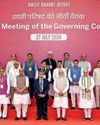
The Kochi-Muziris Biennale—which is now a fixture on the cultural landscape of the country—began as a government initiative, when the department of cultural affairs of the Kerala government approached artists Riyas Komu and Bose Krishnamachari in 2010 to organise an international art extravaganza. The challenge was mammoth. There was no existing infrastructure necessary for an exhibition of this scale and no institutional support structures.
“There was no weather-controlled spacing available in Kochi for exhibiting artworks,” says Krishnamachari. “That is when a friend suggested that Aspinwall House was up for sale, why did we not try speaking with the buyers, DLF. I also consulted with a few directors of other biennales like the Lyon and the Gwangju Biennale to understand how to structure one and how to find the funding. Then we put together a report and went to Delhi for the funds.” In their initial report, they had asked for a funding of 0102 crore. After all, as Krishnamachari points out, it took nearly 40 million Euros to organise a prestigious art event like Documenta in Germany. In the end, the first Kochi-Muziris Biennale was organised with 017 crore, with Komu and Krishnamachari putting in much of their personal savings into the project. “We spent very little [compared to other biennales] and got much more,’ says Kxishnamachari.
The first edition of the biennale in 2012-2013 was an undisputed triumph. Showcasing the works of 94 artists from 23 countries, the event attracted a footfall of 4 lakh visitors from all over the world. It was the only one from India listed that year in Forbes’s 13 Cultural Events to be Seen in 2012!
Diese Geschichte stammt aus der January 01, 2023-Ausgabe von THE WEEK India.
Starten Sie Ihre 7-tägige kostenlose Testversion von Magzter GOLD, um auf Tausende kuratierte Premium-Storys sowie über 8.000 Zeitschriften und Zeitungen zuzugreifen.
Bereits Abonnent ? Anmelden
Diese Geschichte stammt aus der January 01, 2023-Ausgabe von THE WEEK India.
Starten Sie Ihre 7-tägige kostenlose Testversion von Magzter GOLD, um auf Tausende kuratierte Premium-Storys sowie über 8.000 Zeitschriften und Zeitungen zuzugreifen.
Bereits Abonnent? Anmelden

Doctor's doctors
Internists deal with prevention, diagnosis and treatment of all kinds of diseases, while also coordinating with doctors across specialties

WORK THIS OUT!
What is the true cost of a 90-hour workweek? Reduced productivity, mental health issues and severe health risks, say doctors

The experience of oppression
The British enacted several laws that might appear liberal, only to then veto the invocation of progressive measures. Nevertheless, these milestones guided the founding fathers in conceiving and creating the Constitution of India

One, two, buckle my shoe!
“Darling,” I said to my life companion of more years than I care to remember, “Do you think there is any correlation between pain in the feet and attending prayer meetings?”“You really are a stupid old man!” said the light of my life. “Can’t you think of anything more bizarre so late at night?”

A helping hand
Over the past year, Imaginarium has placed 3D-printed parts in space, in human bodies, in oil fields in the Middle East, and as drones on the Indian border

Fading federalism
One of the most visible indicators of the erosion of state autonomy is the diminishing financial independence of states

FOUNDING MOTHERS OF THE CONSTITUTION
THEIR CONTRIBUTION IN THE MAKING OF THE REPUBLIC REMAINS EXEMPLARY AND INSPIRING

Value every breath
VO2 max is the best way to measure fitness and predict life expectancy

Statutes of unity
The Constitution reminds us that national oneness comes through addressing inequalities, not enforcing uniformity

Incomplete equality
Equal marriage rights is one of the last bastions of patriarchy and to dismantle it, the recognition of marital rape as an offence is non-negotiable